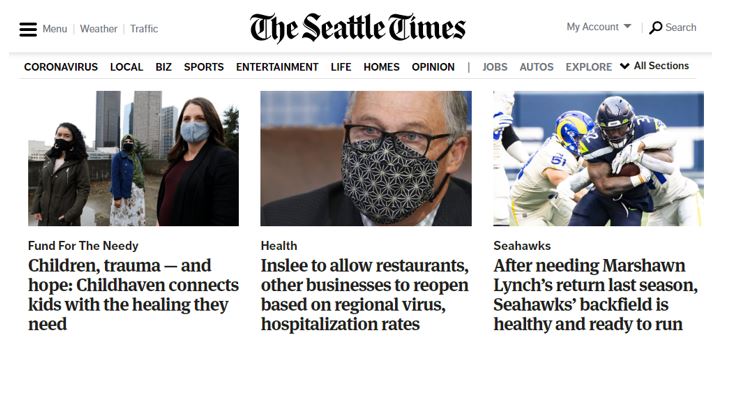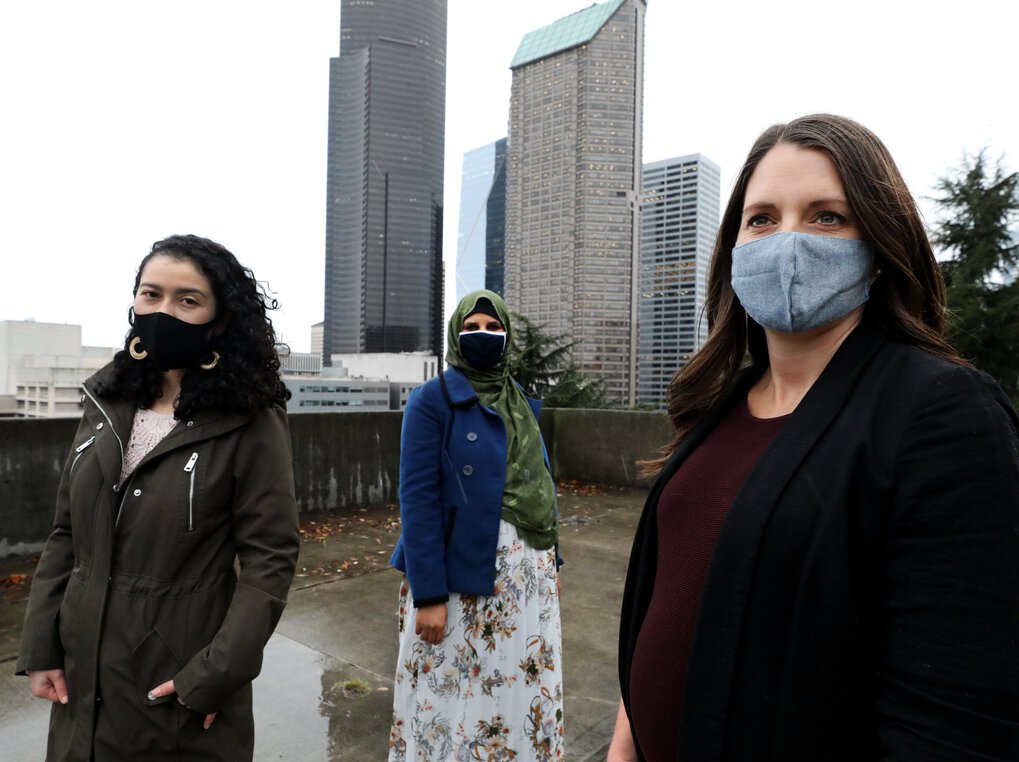Childhaven Featured in The Seattle Times

A continued legacy of connecting healing services to children who have suffered trauma
Article written by Christine Clarridge Seattle Times staff reporter
Fear built into the core of a little body — whether it’s from wars and pandemics or from sick and dysfunctional family members — leaves its marks. And the marks cost. They cost the children who grow up carrying often unseen wounds that may compel them in adulthood to behaviors they don’t understand. And they cost everybody else, too.
People who study children now have reams of science proving that trauma experienced in childhood is the root of much addiction, homelessness and crime, as well as a contributor to diabetes, heart disease and cancer.
Getting at it as early as possible is important.
That’s the undertaking at Childhaven, one of a dozen nonprofits that benefits from readers’ donations to The Seattle Times Fund For The Needy campaign, where the method is changing but the mission is not.
Founded more than 100 years ago as a day nursery, the agency brought the federal Head Start child development program to the West Coast and became a national leader in addressing child abuse and neglect.
For years, the agency served families referred for services by state agencies or the courts. But these days, it’s focused on building healing relationships with families and partnerships with established child-service agencies, such as Ryther, Friends of the Children, the Skyway Coalition and Renton Innovation Zone. In June, Renton Area Youth & Family Services and Art with Heart merged with Childhaven, which in the past year served more than 1,500 children and families with therapeutic services, more than 3,325 tele-health visits from its providers and more than 7,560 hours of outpatient mental health visits.
The partnerships allow Childhaven to get the information, resources and services it provides out to people where they are — at clinics, community resource centers and schools — and to broaden the message that, far from being an anomaly, childhood trauma is common, that there’s no shame in needing help, and that even the deepest issues can respond to treatment.
“Kids and families are better served, both individually and at a community level, when organizations across the sector collaborate creatively. Working together is the only way to transform the systems so that they work better for everyone,” said Childhaven’s CEO Jon Botten.

The success of the Family Navigator Project at the Pediatric Clinic at Harborview is one example of that, said Fernanda Martinez Novoa.
When she worked for Childhaven as a home visitor, it could take parents a long time to accept the idea that their child might have a learning delay, she said. Now, with the support of medical personnel at her side, parents are more willing to hear her suggestions and accept help.
“It’s a bridge between health and education and a way to bring the services to where the families are,” she said.
From left, Childhaven caseworkers Fernanda Martinez Novoa and Farhiyo Ahmed, and Dr. Abigail Grant, who helped start the Family Navigator Project at the Pediatric Clinic at Harborview. (Alan Berner / The Seattle Times)
Dr. Abigail Grant, who helped start the Harborview partnership project two years ago said seeing the numbers of families that have been connected to services through the project has been gratifying.
Between 2016 and 2018, only about 41% of the families that came into the Pediatric Clinic were getting evaluated for needs; in the last two years, that number has climbed to 96% and the percentage of clients who followed through likewise soared, she said.
“We’re very proud of that. Pediatricians make lots of referrals, but getting people connected to the services is where you usually see a huge drop off,” Grant said.
Having the clinic as a touchpoint for a family, where they can receive wraparound services and assistance with things like paperwork, language interpretation and transportation that the navigators can sometimes provide, breaks down a lot of barriers, she said.
Nancy Cortes Ramirez was initially reluctant to accept the idea that her child, Dana, now 3, had a speech delay.
She grew up in a culture that taught that children should not be forced to speak, and she was ashamed and afraid.
“I felt very guilty,” she said through a Spanish interpreter in a recent teleconference. “I thought it was my fault because I didn’t have the prenatal vitamins.”
But Martinez Novoa was able to explain reasons why her child might not be talking and ways it could be addressed.
After just a few months of speech therapy, her daughter was on track for preschool.
“At the beginning, people might have their mind closed to it and think my child doesn’t need it,” said Cortes Ramirez. “But once you get in the program, it is very good. It helps the parents and the kids.”
Laurette Kionga is another mother who credits the help she got for her son Samuel to the Childhaven partnership.
She noticed that her son was not speaking well and was having a hard time saying certain words, she said through a French interpreter. She was referred for speech therapy but didn’t make it to the appointment.
Farhiyo Ahmed, another Childhaven employee with the Family Navigator Project, called to find out what happened. It turned out that transportation was an issue, and Ahmed was able sign the family up for home services. A simple solution, perhaps, but Kionga said she would not have been able to hurdle that barrier without help, and the changes in her son are dramatic.
“He used to not say anything at all. He didn’t try to communicate, now he speaks really very well. The coach showed me how to interact and what I needed to do with him and we both learned something,” said Kionga.
Said Ahmed: “What I ask myself is what I can do for this family right now, what is it they are looking for and who is the right person to help. And if I can help even a little it’s very worthwhile because little things grow into big things.”
What your donation means to Childhaven
Childhaven is focused on building healing family relationships and partnerships with established child-service agencies.
$50: Learn (Your $50 gift could help provide sensory materials and multi-cultural books for our early learning classrooms.)
$100: Connect (Your $100 donation could help a child and their family receive counseling services to boost self-esteem and strengthen their relationships with peers and family members.)
$250: Play (Your $250 donation could support our community Play and Learn groups, which facilitate learning for both parents and toddlers using fun activities to promote family bonding.)
$500: Thrive (Your $500 gift could help kids learn to express their emotions creatively through art or music – building emotional literacy and resilience skills.)
$1000: Live (Your gift of $1,000 could support our wraparound teams who work with families of young children who have significant social, emotional and behavioral needs, partnering with them to develop goals and a support plan for their family.)
